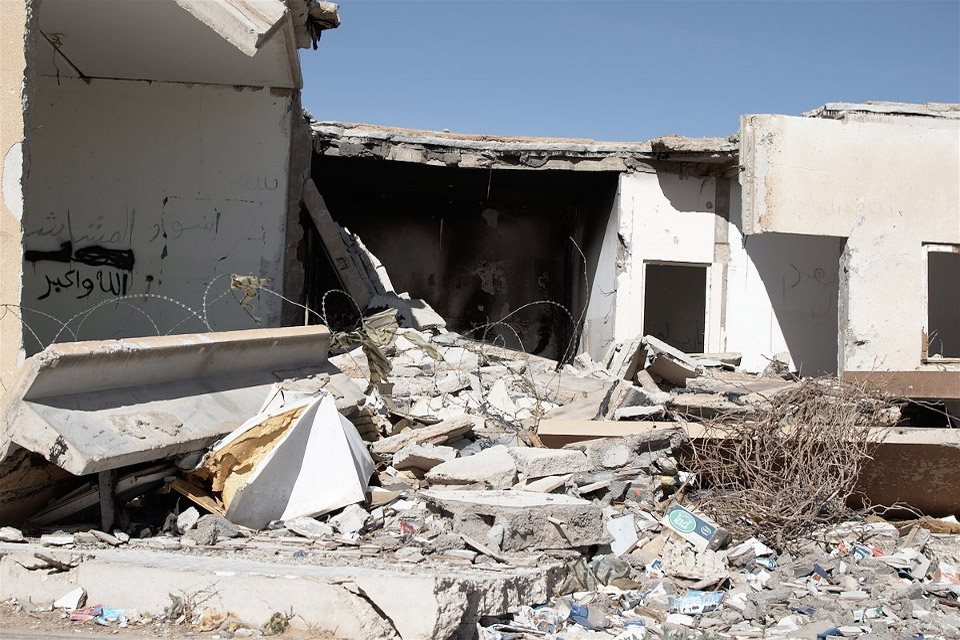
A destroyed house in Ahy Badr in the town of Mizdah in the Nafusa mountains in Libya after tribal conflict in March 2013. Photo: IRIN/Jorge Vitoria Rubio
The primary objective of the meeting, which will be hosted by the UN Support Mission in Libya (UNSMIL) at the United Nations Office at Geneva, will be to reach agreement on the management of the remainder of the transitional period, including the formation of a unity government that enjoys wide support, and pave the way for a stable environment for the constitutional process in which a new permanent constitution can be adopted.
In a press statement, UNSMIL noted that the discussions between the Libyan stakeholders will also seek to put in place the necessary security arrangements in order to bring an end to the armed hostilities raging in different parts of the country.
The agreement to hold the next round of dialogue comes after wide-ranging and intensive consultations with the parties by UNSMIL chief Bernardino León over the past several weeks. To create a conducive environment for the dialogue, Mr. León has proposed to the parties to the conflict a “freeze” in military operations for a few days.
As fighting between armed factions continued to rattle the war-weary North African nation, Mr. León warned just days ago that time was running out, and the longer efforts to tackle the crisis are delayed, the more difficult it would be to reach a solution to end the fighting, restore political and State institutional unity and revive the economy.
Emphasizing that the political dialogue process is Libyan-led, and that the Mission’s facilitating role is to help in the search for common ground, UNSMIL stressed today that this new dialogue “is an important opportunity for the Libyans to restore stability and prevent the country’s slide towards deeper conflict and economic collapse that should not be missed.”
The Mission urged the main stakeholders to approach the fresh talks with courage and determination and put the national interest above all other considerations in this critical juncture in the country’s political transition, “abiding by the democratic principles of the 17th of February revolution that united the Libyan people and also united the international community in support of Libya.”
Libya’s civil war began in 2011 and resulted in the ouster of late Libyan leader Muammar Gaddafi.
FRENCH VERSION
L’objectif principal de cette réunion, qui sera organisée par laMission d’appui des Nations Unies en Libye (UNSMIL) à l’Officedes Nations Unies à Genève, sera à mettre d’accord sur la gestiondu reste de la période de transition, y compris la formation d’ungouvernement d’Union nationale qui bénéficiant d’un largesoutien, et ouvrir la voie à un environnement stable pour leprocessus constitutionnel dans lequel une nouvelle constitutionpermanente peut être adoptée.
Dans une déclaration à la presse, UNSMIL a noté que lesdiscussions entre les parties prenantes libyens seront efforceraégalement de mettre en place les mesures de sécurité nécessairesafin de mettre un terme aux hostilités armées qui fait rage dansdifférentes parties du pays.
L’accord de tenir la prochaine session du dialogue vient après lavastes et intenses consultations avec les parties par UNSMIL chefBernardino León au cours des dernières semaines. Pour créer unenvironnement propice au dialogue, M. León a proposé auxparties au conflit un « gel » des opérations militaires pendantquelques jours.
Alors que les combats entre factions armées ont continué àsecouer la nation nord-africaine Las de la guerre, M. Léon a mis en garde il y a quelques jours que le temps était compté et la plus longue lutte contre la crise sont retardés, il serait plus difficile detrouver une solution pour mettre fin aux combats, restaurerl’unité institutionnelle politique et de l’État et relancer l’économie.
Soulignant que le processus de dialogue politique est axée sur laLibye, et que la Mission de faciliter le rôle est d’aider à larecherche d’un terrain d’entente, UNSMIL a souligné aujourd’huique ce nouveau dialogue « est une occasion importante pour lesLibyens à rétablir la stabilité et empêcher le glissement du paysvers des conflits plus profonds et l’effondrement économique quine devrait pas être manquée ».
La Mission a exhorté les principales parties prenantes à l’approchedes pourparlers fraîches avec courage et détermination et mettrele national d’intérêt avant tout autres considérations en cemoment crucial dans la transition politique du pays, « respectentles principes démocratiques du XVIIe de la révolution de févrierqui, Unis au peuple libyen aussi Unie de la communautéinternationale à l’appui de la Libye. »
Guerre civile de Libye a commencé en 2011 et a abouti à l’évictionde leader de la fin libyen Muammar Gaddafi.


